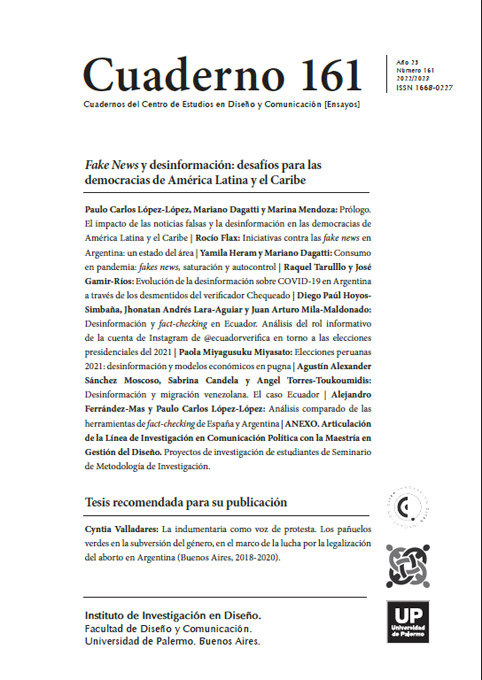Prólogo. El impacto de las noticias falsas y la desinformación en las democracias de América Latina y el Caribe
Abstract
This issue of Cuadernos del Centro de Estudios en Diseño y Comunicación by the University of Palermo is part of the Political Communication research line. It compiles seven articles plus this introduction that reflect on the impact that fake news trigger in Latin American democracies, including from case studies that allow us to understand how this phenomenon has developed in a particular country, to comparisons between countries or regions. Similarly, there are several contributions that analyze the verification companies or the fact-checking phenomenon, addressing the production, circulation and impact of false news, especially in electoral, conflict or crisis contexts, such as those that many countries of the region have experimented in recent years. From different methodological perspectives, this compilation is nourished by original aspects when observing the fake news phenomenon and its multiple impacts on nuclear aspects of democracy, such as the access to verified and quality information.
References
Barredo-Ibáñez, D.; De-la-Garza-Montemayor, D. J.; Torres-Toukoumidis, Á. y LópezLópez, P. C. (2021). Artificial intelligence, communication, and democracy in Latin America: a review of the cases of Colombia, Ecuador, and Mexico. Profesional de la Información, 30(6).
Becerra, M. A (2014). Medios de comunicación: América Latina a contramano; Fundación Foro Nueva Sociedad; Nueva Sociedad; 249, 61-74
Chou, W. Y. S.; Gaysynsky, A. y Vanderpool, R. C. (2021). The COVID-19 Misinfodemic: moving beyond fact-checking. Health Education& Behavior, 48(1), 9-13. https://doi.org/10.1177/1090198120980675
Fraga-Lamas, P. y Fernández-Caramés, T. M. (2020). Fake news, disinformation, and deepfakes: Lever-aging distributed ledger technologies and blockchain to combat digital deception and counterfeit reality. IT Professional, 22(2), 53-59. https://doi.org/10.1109/MITP.2020.2977589
Graves, L. (2018). Boundaries not drawn: Mapping the institutional roots of the global fact-checking move-ment. Journalism Studies, 19(5), 613-631. https://doi.org/10.1080/1461670X.2016.1196602
Hallin, D. C. y Mancini, P. (2004). Comparing media systems: Three models of media and politics. Cambridge university press.
Illades, E. (2018). Fake news: la nueva realidad. Grijalbo. Krause, N. M.; Freiling, I.; Beets, B. y Brossard, D. (2020). Fact-checking as risk communication: themulti-layered risk of misinformation in times of COVID-19. Journal of Risk Research, 23(7-8),1052-1059. https://doi.org/10.1080/13669877.2020.1756385
López-López, P. C.; Lagares Díez, N. y Puentes-Rivera, I. (2021). La inteligencia artificial contra la desinformación: una visión desde la comunicación política. Razón y Palabra, 25(112), 5-11.
Martínez Nicolás, M. (2015). Investigar las culturas periodísticas. Propuesta teórica y aplicación al estudiodel periodismo político en España. Revista internacional de comunicación y desarrollo (RICD), 1(1),127-137.
Pauner Chulvi, C. (2018). Noticias falsas y libertad de expresión e información. El control de los contenidos informativos en la red. Teoría y realidad constitucional, 41, 297-318.
Rodríguez Pérez, C. (2020). Una reflexión sobre la epistemología del fact-checking journalism: retos ydilemas. Revista de Comunicación, 19(1), 243-258. https://doi.org/10.26441/rc19.1-2020-a14
Sierra Caballero, F. y Sola-Morales, S. (2020). Golpes mediáticos y desinformación en la era digital. La guerra irregular en América Latina. Comunicación y sociedad, 17, 1-30.
Steensen, S. (2019). Journalism’s epistemic crisis and its solution: Disinformation, datafication and sourcecriticism. Journalism, 20(1), 185-189. https://doi.org/10.1177%2F1464884918809271
Torres-Soriano, M. R. (2020). Democracia vs. desinformación: Propuestas para la protección de las sociedades abiertas. Colección Actualidad (Centro de Estudios Andaluces), (87), 1-18.
Los autores/as que publiquen en esta revista ceden los derechos de autor y de publicación a "Cuadernos del Centro de Estudios de Diseño y Comunicación", Aceptando el registro de su trabajo bajo una licencia de atribución de Creative Commons, que permite a terceros utilizar lo publicado siempre que de el crédito pertinente a los autores y a esta revista.


